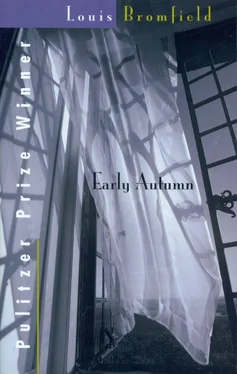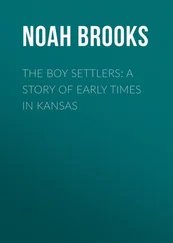“She has a great deal to occupy her at Pentlands. And it’s true that it’s not a very fascinating life. Still, I’m sure she couldn’t bear being pitied. … She’s the last woman in the world to want pity.”
Curiously, O’Hara flushed, the red mounting slowly beneath the dark-tanned skin.
“I thought,” he said a little sadly, “that her husband or Mrs. Struthers might have raised objections. … I know how they feel toward me. There’s no use pretending not to know.”
“It is quite possible,” said Sabine.
There was a sudden embarrassing silence, which gave Sabine time to pull her wits together and organize a thousand sudden thoughts and impressions. She was beginning to understand, bit by bit, the real reasons of their hatred for O’Hara, the reasons which lay deep down underneath, perhaps so deep that none of them ever saw them for what they were.
And then out of the silence she heard the voice of O’Hara saying, in a queer, hushed way, “I mean to ask something of you … something that may sound ridiculous. I don’t pretend that it isn’t, but I mean to ask it anyway.”
For a moment he hesitated and then, rising quickly, he stood looking away from her out of the door, toward the distant blue marshes and the open sea. She fancied that he was trembling a little, but she could not be certain. What she did know was that he made an immense and heroic effort, that for a moment he, a man who never did such things, placed himself in a position where he would be defenseless and open to being cruelly hurt; and for the moment all the recklessness seemed to flow out of him and in its place there came a queer sadness, almost as if he felt himself defeated in some way. …
He said, “What I mean to ask you is this. … Will you ask me sometimes here to the cottage when she will be here too?” He turned toward her suddenly and added, “It will mean a great deal to me … more than you can imagine.”
She did not answer him at once, but sat watching him with a poorly concealed intensity; and presently, flicking the cigarette ashes casually from her gown, she asked, “And do you think it would be quite moral of me?”
He shrugged his shoulders and looked at her in astonishment, as if he had expected her, least of all people in the world, to ask such a thing.
“It might,” he said, “make us both a great deal happier.”
“Perhaps … perhaps not. It’s not so simple as that. Besides, it isn’t happiness that one places first at Pentlands.”
“No. … Still. …” He made a sudden vigorous gesture, as if to sweep aside all objections.
“You’re a queer man. … I’ll see what can be done.”
He thanked her and went out shyly without another word, to stride across the meadows, his black head bent thoughtfully, in the direction of his new bright chimneys. At his heels trotted the springer, which had lain waiting for him outside the door. There was something about the robust figure, crossing the old meadow through the blue twilight, that carried a note of lonely sadness. The self-confidence, the assurance, seemed to have melted away in some mysterious fashion. It was almost as if one man had entered the cottage a little while before and another, a quite different man, had left it just now. Only one thing, Sabine saw, could have made the difference, and that was the name of Olivia.
When he had disappeared, Sabine went up to her room overlooking the sea and lay there for a long time thinking. She was by nature an indolent woman, especially at times when her brain worked with a fierce activity. It was working thus now, in a kind of fever, confused and yet tremendously clear; for the visits from Aunt Cassie and O’Hara had ignited her almost morbid passion for vicarious experience. She had a sense of being on the brink of some calamity which, beginning long ago in a hopeless tangle of origins and motives, was ready now to break forth with the accumulated force of years.
It was only now that she began to understand a little what it was that had drawn her back to a place which held memories so unhappy as those haunting the whole countryside of Durham. She saw that it must have been all the while a desire for vindication, a hunger to show them that, in spite of everything, of the straight red hair and the plain face, the silly ideas with which they had filled her head, in spite even of her unhappiness over her husband, she had made of her life a successful, even a brilliant, affair. She had wanted to show them that she stood aloof now and impregnable, quite beyond their power to curb or to injure her. And for a moment she suspected that the half-discerned motive was an even stronger thing, akin perhaps to a desire for vengeance; for she held this world about Durham responsible for the ruin of her happiness. She knew now, as a worldly woman of forty-six, that if she had been brought up knowing life for what it was, she might never have lost the one man who had ever roused a genuine passion in a nature so hard and dry.
It was all confused and tormented and vague, yet the visit of Aunt Cassie, filled with implications and veiled attempts to humble her, had cleared the air enormously.
And behind the closed lids, the green eyes began to see a whole procession of calamities which lay perhaps within her power to create. She began to see how it might even be possible to bring the whole world of Pentlands down about their heads in a collapse which could create only freedom and happiness to Olivia and her daughter. And it was these two alone for whom she had any affection; the others might be damned, gloriously damned, while she stood by without raising a finger.
She began to see where the pieces of the puzzle lay, the wedges which might force open the solid security of the familiar, unchanging world that once more surrounded her.
Lying there in the twilight, she saw the whole thing in the process of being fitted together and she experienced a sudden intoxicating sense of power, of having all the tools at hand, of being the dea ex machinâ of the calamity.
She was beginning to see, too, how the force, the power that had lain behind all the family, was coming slowly to an end in a pale, futile weakness. There would always be money to bolster up their world, for the family had never lost its shopkeeping tradition of thrift; but in the end even money could not save them. There came a time when a great fortune might be only a shell without a desiccated rottenness inside.
She was still lying there when Thérèse came in—a short, plain, rather stocky, dark girl with a low straight black bang across her forehead. She was hot and soiled by the mud of the marshes, as the red-haired unhappy little girl had been so many times in that far-off, half-forgotten childhood.
“Where have you been?” she asked indifferently, for there was always a curious sense of strangeness between Sabine and her daughter.
“Catching frogs to dissect,” said Thérèse. “They’re damned scarce and I slipped into the river.”
Sabine, looking at her daughter, knew well enough there was no chance of marrying off a girl so queer, and willful and untidy, in Durham. She saw that it had been a silly idea from the beginning; but she found satisfaction in the knowledge that she had molded Thérèse’s life so that no one could ever hurt her as they had hurt her mother. Out of the queer nomadic life they had led together, meeting all sorts of men and women who were, in Sabine’s curious sense of the word, “complete,” the girl had pierced her way somehow to the bottom of things. She was building her young life upon a rock, so that she could afford to feel contempt for the very forces which long ago had hurt her mother. She might, like O’Hara, be suddenly humbled by love; but that, Sabine knew, was a glorious thing well worth suffering.
Читать дальше












